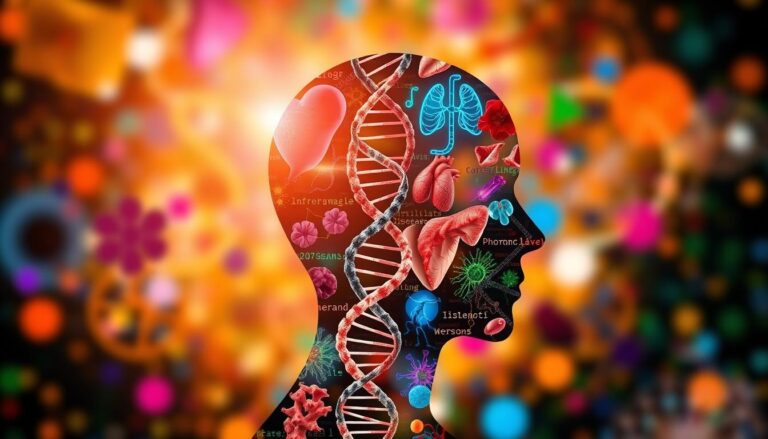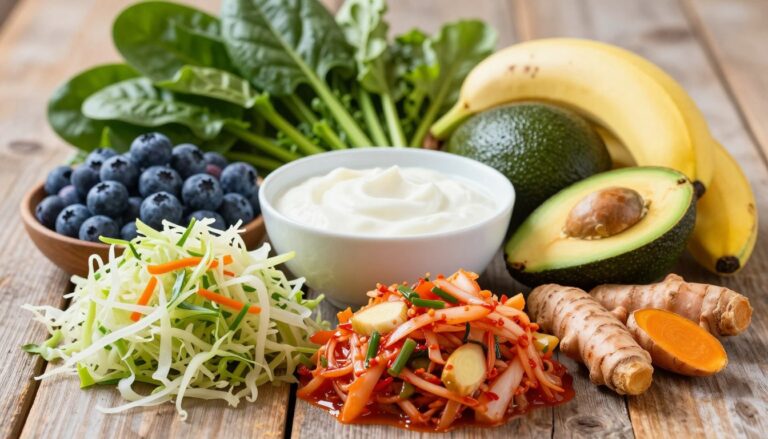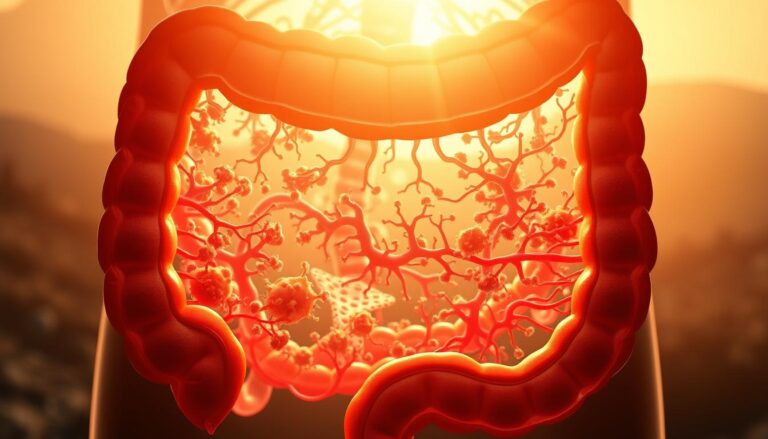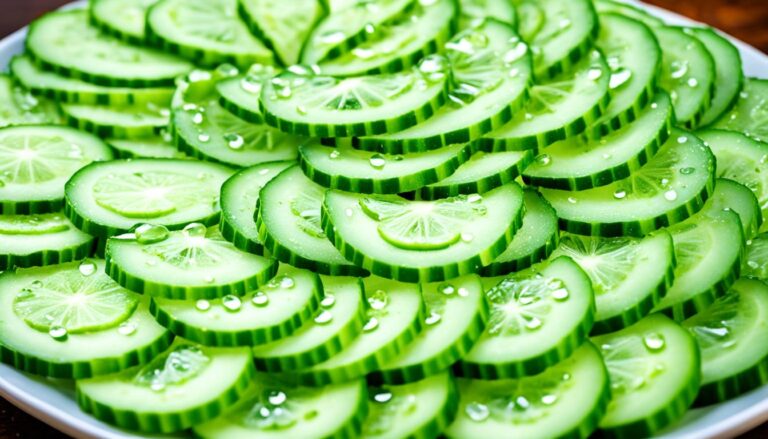Protein is key for a healthy active life. It helps grow and repair muscles and boosts overall health. But which foods have the most protein?
Get ready to discover the Top 11 High Protein Foods that can elevate your health and fitness.
Key Takeaways
- Protein is essential for cell structure, immune function, movement, and hormone synthesis.
- The recommended daily protein intake ranges from 0.8 to 2.0 grams per kilogram of body weight.
- Incorporating a variety of protein-rich foods like eggs, almonds, chicken, and dairy can support overall health.
- High-protein diets can aid in weight management by promoting feelings of fullness and satisfaction.
- Consuming a balanced, protein-rich diet provides the building blocks for a healthier, more active you.
The Importance of Protein in Your Diet
Protein is key for our health and well-being. It helps with cell structure, immune function, and movement. It also aids in chemical reactions and hormone synthesis. Our bodies need nine essential amino acids, which we get from food.
Understanding Protein’s Role in Overall Health
Eating enough protein rich diet has many benefits. It keeps you full and helps with weight management. Research shows that protein helps keep muscles strong and supports brain function.
Plant-based proteins are good for aging well.
Meeting Your Daily Protein Requirements
The daily protein need is 0.36 grams per pound of body weight. This is the minimum your body needs. National Institutes of Health data shows proteins have 20 amino acids.
Protein helps with weight management and lowers blood pressure risk. It aids in injury recovery and keeps the immune system strong.
Healthy adults should get 10%-35% of their calories from protein. This means 50-175 grams of protein in a 2,000 calorie diet. But, older people, pregnant women, and those who are very active might need more protein.

Eggs A Nutrient Dense Protein Powerhouse
Eggs are packed with high-quality protein. A large egg has about 6 grams of protein. They also have vitamins, minerals, healthy fats, and antioxidants. Whole eggs, including the yolk, offer more nutrients than just egg whites.
Protein is key for building and fixing body tissues. Eggs have all the amino acids we need. This makes them great for muscle building and health.
Eggs are also good for your eyes and brain. They have choline, lutein, and zeaxanthin. These help prevent eye diseases like cataracts and macular degeneration.
Some people worry about cholesterol from eggs. But most studies show eggs don’t raise blood cholesterol. In fact, eggs might even help lower bad cholesterol.
Eating high-protein foods like eggs is good for health. They support muscle building and weight control. Eggs are versatile and nutritious, making them a key part of a healthy lifestyle.
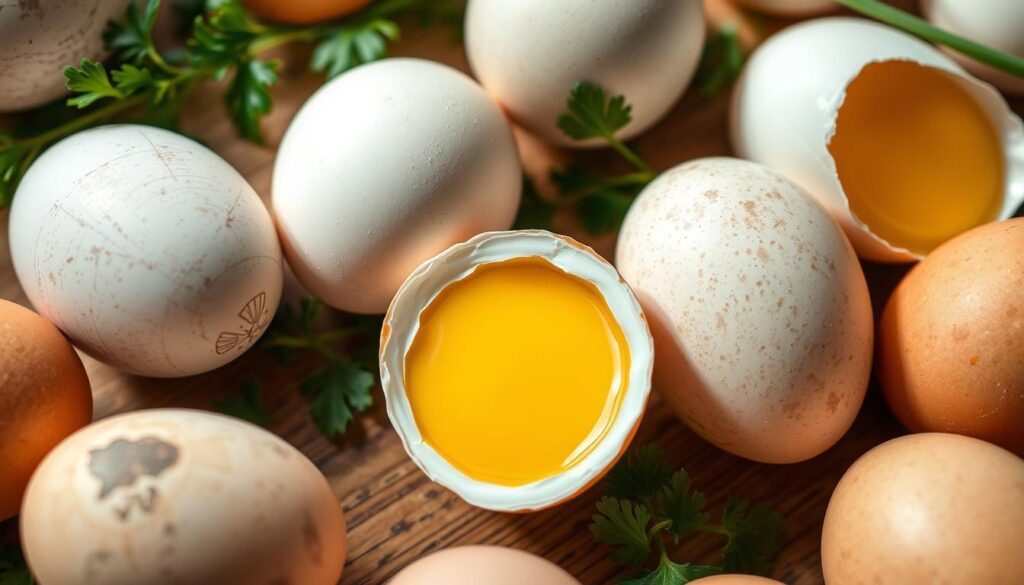
Eggs are one of the most nutritious foods on the planet, containing a wide range of essential vitamins, minerals, and high-quality protein.
Almonds: A Crunchy and Protein-Packed Snack
Almonds are a great choice for high-protein snacks. They are not only full of plant-based protein but also have lots of vitamins, minerals, and healthy fats. These nutrients are good for your health.
The Nutritional Benefits of Almonds
One ounce 28.35 grams of almonds has 6 grams of protein. They are also rich in fiber, vitamin E, manganese, and magnesium. These nutrients help your heart stay healthy and support overall well-being.
Eating almonds can help you get more healthy fats. They have monounsaturated and polyunsaturated fats. These fats can lower the risk of heart disease. They also make you feel full, making almonds a great snack.
Almonds are a nutritional powerhouse, providing a delicious and convenient way to incorporate more protein, fiber, and healthy fats into your diet. – Registered Dietitian, Sarah Johnson
You can enjoy almonds on their own, in trail mixes, or as a topping for yogurt or salads. They are a nutritious and versatile snack for any healthy diet.
Chicken Breast Lean and High in Protein
Chicken breast is great for boosting your protein intake. It’s lean and packed with essential nutrients. A half chicken breast 86 g has 26.7 g of protein, perfect for muscle growth.
Chicken breast is also rich in B vitamins like niacin, vitamin B6, and vitamin B12. These vitamins help with energy, red blood cells, and the nervous system. It also has zinc and selenium, key for a strong immune system and thyroid health.
| Nutrient | Amount per 100g |
|---|---|
| Protein | 32g |
| Fat | 3.6g |
| Calories | 165 |
| Vitamin B6 | 0.5mg |
| Niacin | 7.2mg |
| Vitamin B12 | 0.3μg |
| Zinc | 1.1mg |
| Selenium | 22.2μg |
Eating chicken breast can help you meet your protein needs. It’s also full of vitamins and minerals. You can grill, bake, or use it in many dishes. It’s a healthy, high-protein choice for your diet.

Chicken breast is a fantastic source of lean, high-quality protein that can help support muscle building and overall health.
TOP 11 HIGH PROTEIN FOODS
Adding high-protein foods to your diet can change the game for muscle building and health. Whether you’re an athlete, bodybuilder, or just want to eat better, these foods are key.
- Eggs: One large egg has 6 grams of high-quality protein. It’s great for building muscle and staying healthy.
- Almonds: A 1-ounce serving of almonds about 23 nuts has 6 grams of protein. They also offer good fats, fiber, and vitamins.
- Chicken Breast: Chicken breast is lean and has 24 grams of protein per 4-ounce serving. It’s a favorite for its versatility and protein.
- Cottage Cheese: Cottage cheese has 23 grams of protein per cup. It’s creamy and packed with protein, perfect for meals and snacks.
- Greek Yogurt: Greek yogurt has nearly 20 grams of protein per 7-ounce serving. It’s thick and protein-rich, great on its own or in recipes.
- Milk: Milk is a classic protein source. A cup has 8 grams of protein to help build muscle.
- Lentils: Lentils are nutrient-dense legumes with about 18 grams of protein per cooked cup. They’re a great plant-based option.
- Lean Beef: Lean beef, like sirloin or ground turkey, has around 25 grams of protein per 4-ounce serving.
- Fish: Fatty fish like salmon are high in protein 22 grams per 3.5-ounce serving and omega-3s.
- Quinoa: Quinoa is a gluten-free grain that’s a complete protein source. It offers over 8 grams of protein per cooked cup.
- Protein Powders: Whey, casein, and plant-based protein powders are easy ways to increase your protein. They’re great for athletes and bodybuilders.
Adding these top 11 high-protein foods to your diet can meet your daily protein needs. It supports muscle building and overall health. Remember to mix these foods with other nutrient-dense foods for a balanced diet.
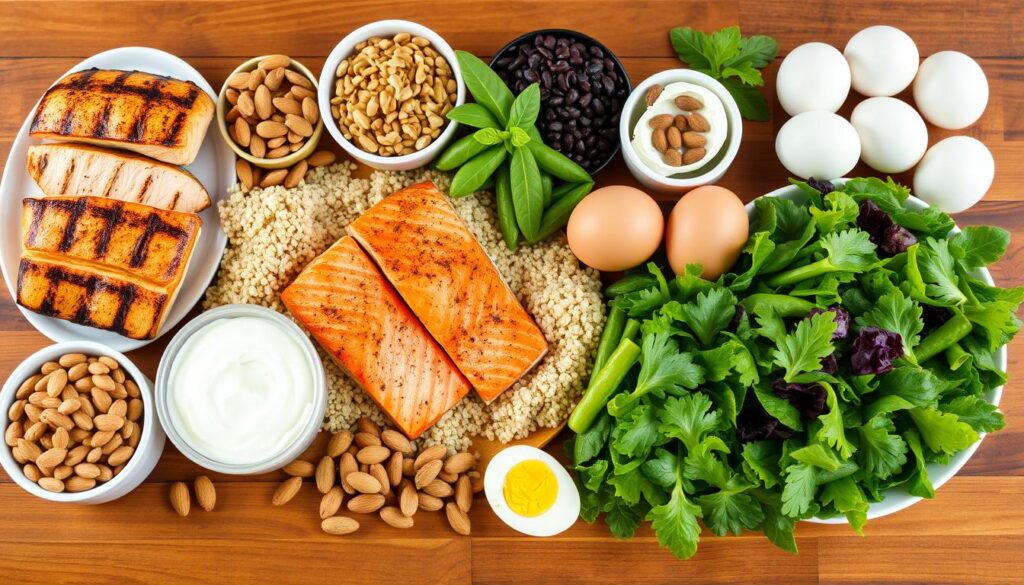
Cottage Cheese A Creamy and Protein Rich Delight
Cottage cheese is a nutritious dairy product that’s great for your diet. It’s full of protein and has few calories. It’s perfect for building muscle, managing weight, or just enjoying a tasty healthy snack.
Exploring the Nutritional Profile of Cottage Cheese
One cup 226 g of cottage cheese has 28 grams of high-protein dairy. It’s also packed with calcium, phosphorus, selenium, vitamin B12, and riboflavin. Its creamy texture and mild taste make it easy to add to many dishes, helping with muscle building and weight management.
Cottage cheese has all nine essential amino acids, making it a complete protein. It’s great for vegetarians or anyone wanting more protein without meat. Its high protein can also help you feel full, which can help with healthy weight management.
Cottage cheese is a nutritional powerhouse, providing a delicious and convenient way to boost your protein intake and support your overall health and well being.
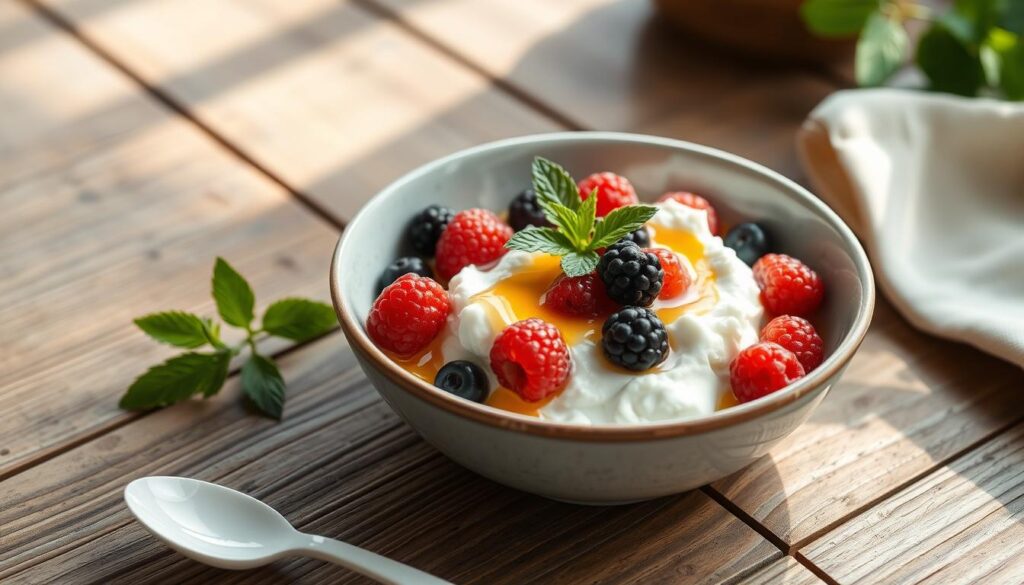
Enjoy cottage cheese on its own, with fruit, or in recipes like cheesecake or macaroni and cheese. It’s a high-protein dairy that can make your diet better. Try it out and see how it can become a key part of your healthy snacks and meals.
Greek Yogurt A Thick and Protein Packed Treat
Greek yogurt is a thick, creamy, and nutritious dairy product. It’s known for its high protein content. This makes it great for building muscle, managing weight, and fueling an active lifestyle.
One 5.3-ounce 150-gram serving of plain, nonfat Greek yogurt has 25 grams of protein. This is much more than regular yogurt, which has 11-16 grams. The straining process for Greek yogurt concentrates the protein, making it more protein-rich.
| Yogurt Brand | Protein per 5.3-oz Serving 150 g |
|---|---|
| Oikos Pro Yogurt | 20 grams |
| Fage Total 0% Yogurt | 16 grams |
| Oikos Triple Zero Yogurt | 15 grams |
| Siggi’s Lower-Sugar Skyr Yogurt | 14 grams |
| Chobani Zero Sugar Yogurt | 12 grams |
Greek yogurt is also packed with other important nutrients. It has calcium, vitamin B12, vitamin A, selenium, and zinc. It’s great as a snack, in smoothies, or in recipes to help with muscle building and weight management.
Choose plain, nonfat or low-fat Greek yogurt without added sugars. These options offer the most high-protein dairy benefits. Greek yogurt is a healthy snack that fits well in a balanced diet.
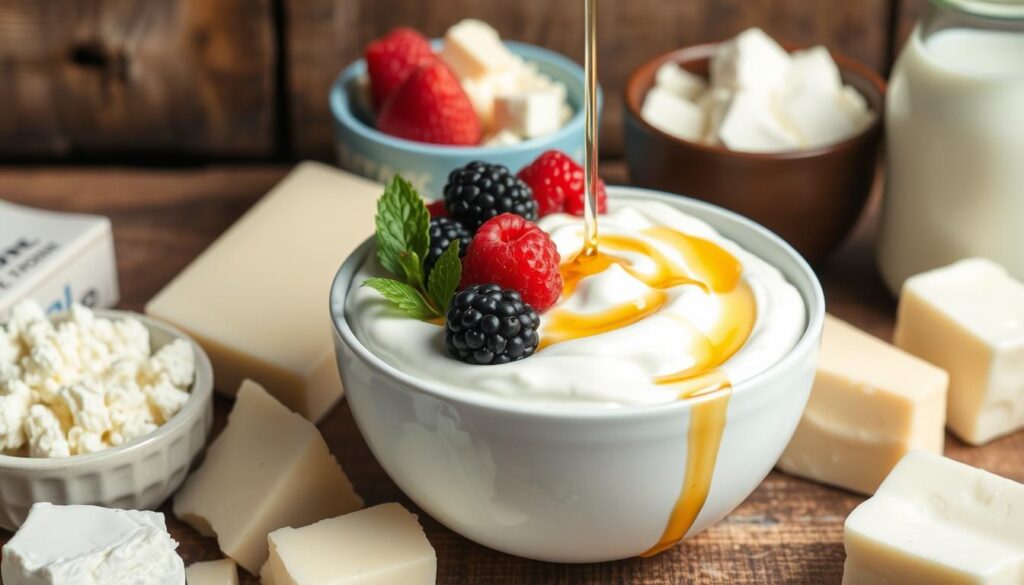
Milk A Classic Source of High Quality Protein
Dairy milk is a top choice for high-quality protein. One cup 246 ml of dairy milk gives you 8.32 grams of protein. This makes it great for a healthy diet aimed at muscle building and weight management.
Milk’s protein is packed with nutrients. It’s a key high-protein dairy for those wanting to boost their overall health.
The Benefits of Dairy Milk
Dairy milk is full of important nutrients. It has calcium, phosphorus, riboflavin, and vitamin B12. These help keep bones, teeth, and the immune system strong.
If you’re not lactose intolerant, milk is easy to add to your diet. It helps meet daily protein needs and boosts well-being.
| Nutrient | Amount per 1 cup 246 ml of Dairy Milk |
|---|---|
| Protein | 8.32 grams |
| Calcium | 293 milligrams |
| Phosphorus | 222 milligrams |
| Riboflavin | 0.4 milligrams |
| Vitamin B12 | 1.2 micrograms |
Adding dairy milk to a balanced diet offers many benefits. It supports muscle building weight management and overall health.
Lentils A Plant Based Protein Powerhouse
Lentils are a great choice for those who want to build muscle, eat healthy, or follow a plant-based diet. They are packed with 9.02 grams of protein per 100 grams about 1/2 cup of cooked lentils. This makes them a top source of high-protein plant-based foods.
Lentils are not just high in protein. They also have lots of fiber, folate, magnesium, potassium, iron, copper, and manganese. These nutrients are key for muscle building and a healthy diet. Eating lentils regularly can also help prevent heart disease and fatty liver disease.
If you’re looking to add more vegetarian/vegan nutrition to your meals, lentils are perfect. They have a nutty taste and a thick texture. You can use them in soups, stews, salads, and more.
| Nutrient | Amount per 100g Cooked Lentils |
|---|---|
| Protein | 9.02g |
| Fiber | 7.9g |
| Folate | 181μg |
| Magnesium | 36mg |
| Potassium | 369mg |
| Iron | 3.3mg |
| Copper | 0.4mg |
| Manganese | 0.5mg |
Adding lentils to your meals can boost your plant-based protein intake. They are also full of nutrients. Whether you’re a vegetarian/vegan or just looking for more protein options, lentils are a great choice. They support muscle building and a healthy diet.
Lean Beef A Protein Rich Staple
Lean beef is a top choice for those looking for high-protein foods. A 3-ounce serving of lean beef packs 24.6 grams of protein. This makes it great for building and keeping muscle strong. It also has lots of iron, zinc, selenium, and vitamins B12 and B6, which are key for health.
While red meat can be good, it’s best to eat it in small amounts. Eating too much red meat might raise the risk of some health problems, like colorectal cancer. It’s better to choose plant-based proteins, fish, and poultry more often. Save lean beef for when you really want a protein-rich treat.
| Protein Source | Protein g per Serving | Calories per Serving | Saturated Fat g per Serving |
|---|---|---|---|
| Lean Beef 3 oz | 24.6 | 164 | 3.1 |
| Chicken Breast 3 oz | 30.0 | 165 | 1.1 |
| Salmon 3 oz | 16.8 | 121 | 0.8 |
| Eggs 1 large | 6.2 | 73.9 | 1.6 |
| Lentils 1/2 cup | 7.3 | 134.5 | 0.2 |
Adding lean beef to your diet can help with muscle building and health. Just remember to keep your portions small. Also, try to mix up your protein sources to get all the nutrients you need.
Fish A Nutritious and Protein Packed Seafood Option
Fish is a great choice for building muscle and staying healthy. It’s full of nutrients and can be a key part of a balanced diet. Eating more fish can boost your health in many ways.
The Health Benefits of Consuming Fish
Fish is a top source of high-quality protein. For example, tuna has up to 27 grams of protein in a 3-ounce serving. Salmon, with 31 grams in a 4-ounce serving, is another great choice. Fish also has vitamins, minerals, and healthy fats that help with muscle building and heart health.
- Fatty fish like salmon, mackerel, and sardines are full of omega-3 fatty acids. These fats can lower inflammation and heart disease risk.
- Many fish, including cod, tuna, and halibut, are rich in vitamin D. Vitamin D is important for bones and the immune system.
- Seafood like shrimp, oysters, and clams are loaded with zinc. Zinc helps with protein making and healing.
The American Heart Association suggests eating fish at least twice a week. There’s a fish for everyone, whether you like mild white fish or oily varieties.
| Fish Variety | Protein grams per serving | Calories per serving |
|---|---|---|
| Yellowtail | 34 | 212 |
| Tuna canned in oil | 33 | 225 |
| Anchovy canned in oil | 52 | 378 |
| Coho Salmon | 31 | 209 |
| Trout | 30 | 215 |
Consuming a variety of fish several times a week can provide many nutrients for a well-balanced diet.
Fish is great for building muscle, heart health, or just adding more nutrients to your diet. It’s a high protein seafood that’s worth eating regularly.
Quinoa A Gluten Free and Protein Rich Grain
Want to boost your high-protein plant-based foods intake? Quinoa is your answer. This grain is packed with protein, making it a top choice for building muscle. It’s also easy to add to a healthy diet.
Quinoa is special because it has all nine essential amino acids. This is great for vegetarians, vegans, and those who avoid gluten. It’s also full of fiber, folate, copper, iron, and zinc, offering a nutritional punch to your meals.
- One cup 185 grams of cooked quinoa delivers 8 grams of protein.
- Quinoa is considered a complete protein, containing all nine essential amino acids.
- This grain is naturally gluten free, making it a great option for those with dietary restrictions.
- Quinoa is a good source of fiber, folate, copper, iron, and zinc, contributing to overall health.
Adding quinoa to your meals is a smart move for more high-protein plant-based foods and muscle growth. You can enjoy it as a side, in salads, or as a base for bowls. It’s a tasty and healthy choice for any diet.
Conclusion
Eating a variety of high-protein foods is key for a healthy lifestyle. Foods like eggs, almonds, and lean meats are great. Also, dairy products and plant-based options like lentils are good choices.
These foods help you meet your protein needs and feel full. They also support muscle building and weight management.
Choosing a balanced diet with protein-rich foods is smart. Protein is very filling. It can also reduce cravings and boost your metabolism.
Adding a high-protein diet to your routine is beneficial. It helps with muscle building, weight management, and overall health. By making smart food choices, you can live a healthier, more energetic life.
